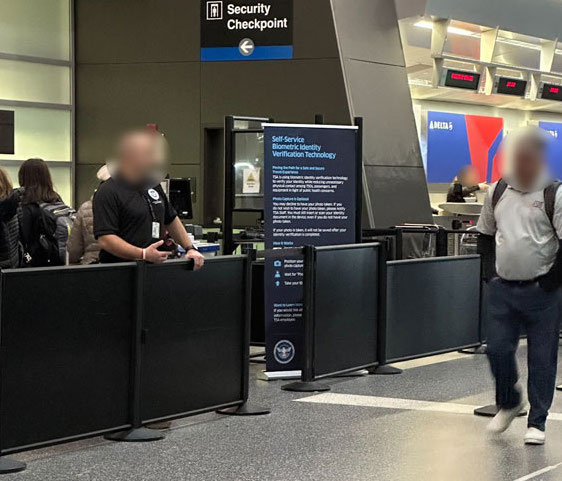Letter: Stop the spread of facial recognition in airports
Senator Chuck Schumer
322 Hart Senate Office Building
Washington, D.C. 20510
Senator Maria Cantwell
511 Hart Senate Office Building
Washington, D.C. 20510
Senator Mitch McConnell
317 Russell Senate Office Building
Washington, D.C. 20510
Senator Ted Cruz
167 Russell Senate Office Building
Washington, DC 20510
May 6, 2024
To Senators Schumer, McConnell, Cantwell, and Cruz,
We are writing to urge you to rein in the use of facial recognition technology by the Transportation Security Administration (TSA) in the United States in the upcoming FAA reauthorization package. With the TSA planning to expand use of this technology to more than 400 airports across the country, it is urgent that you act now to pause this rollout and ensure protections of traveler rights. People shouldn’t have to choose between travel and their privacy.
Why TSA’s expansion of facial recognition must be paused:
- TSA’s facial recognition technology may have accuracy and bias issues. Analysis of facial recognition systems has shown, time and time again, that this technology is less accurate when analyzing certain faces, including Black and brown faces, women, children, and gender nonconforming people. Even the most accurate facial recognition systems misidentify some percentage of people, which when deployed across U.S. airports could amount to tens of thousands of people every day.
- Despite these known potential issues, TSA has failed to conduct and release independent third-party testing that analyzes the accuracy and potential bias issues. TSA cannot be allowed to claim that its facial recognition technology does not have meaningful accuracy or bias issues without independent verification.
- The TSA has failed to provide evidence that facial recognition makes traveling safer or more efficient. Despite piloting facial recognition at airports for several years, the TSA has not publicly shared any reporting that demonstrates the agency’s claims that facial recognition improves security and efficiency.
- The current deployment of facial recognition by the TSA is coercive. While the TSA claims that this program is optional, and that travelers can choose to have a manual ID review instead of having their face scanned, actual experiences show that this is not the case. People who have tried to opt out are faced with opposition and pressure from security agents, written information about travelers’ right to opt out is often missing, hidden, and can be hard to read, and signage uses language like “biometric identity verification technology” (instead of “facial recognition technology”) which likely confuses travelers. All of these practices lead to confusion and obscure peoples’ right not to use this technology.

It may not be possible to meaningfully protect travelers’ rights when using facial recognition, but if the TSA is focused on expansion rather than remedying existing issues, it will fail to fully address these concerns.
We call on Congress to use this opportunity to freeze the expansion of facial recognition in airports to protect travelers so that Congress can conduct meaningful oversight of the program.
Signed,
Advocacy for Principled Action in Government
Algorithmic Justice League
American Civil Liberties Union
Center on Race, Inequality, & the Law at NYU School of Law
Defending Rights & Dissent
Demand Progress
Electronic Frontier Foundation
Electronic Privacy Information Center (EPIC)
Fight for the Future
Free Press Action
Government Information Watch
Mayers Strategic Solutions, LLC
Project On Government Oversight
Public Citizen
Restore the Fourth
Secure Justice
Surveillance Technology Oversight Project (S.T.O.P.)
UnidosUS

